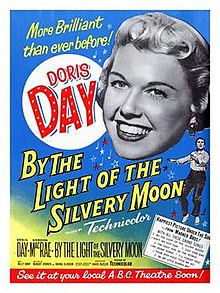
Albert Gordon MacRae was an American actor, singer, and television and radio host. He appeared in the film versions of two Rodgers and Hammerstein musicals, Oklahoma! (1955) and Carousel (1956), and played the leading man opposite Doris Day in On Moonlight Bay (1951) and sequel By The Light of the Silvery Moon (1953).
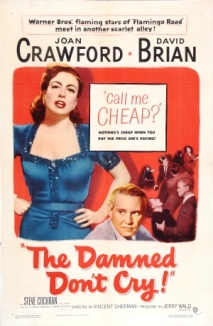
The Damned Don't Cry is a 1950 American film noir crime-drama directed by Vincent Sherman and featuring Joan Crawford, David Brian, and Steve Cochran. It tells of a woman's involvement with an organized crime boss and his subordinates. The screenplay by Harold Medford and Jerome Weidman was based on the story "Case History" by Gertrude Walker. The plot is loosely based on the relationship of Bugsy Siegel and Virginia Hill. The film was directed by Vincent Sherman and produced by Jerry Wald. The Damned Don't Cry is the first of three cinematic collaborations between Sherman and Crawford, the others being Harriet Craig (1950) and Goodbye, My Fancy (1951).

On Moonlight Bay is a 1951 American musical film starring Doris Day and Gordon MacRae, and directed by Roy Del Ruth, which tells the story of the Winfield family at the turn of the 20th century. The movie is based loosely on the Penrod stories by Booth Tarkington. There was a 1953 sequel, By the Light of the Silvery Moon.

"If You Were the Only Girl (In the World)" is a popular song, written by Nat D. Ayer with lyrics by Clifford Grey. It was written for the musical revue The Bing Boys Are Here, which premièred on 19 April 1916 at the Alhambra Theatre in Leicester Square, London. The song was originally performed as a duet between Lucius Bing, played by George Robey, and his love interest Emma, originated by Violet Loraine.

"By The Light of the Silvery Moon" or "By the Light of the Silv'ry Moon" is a popular love song. The music was written by Gus Edwards, and the lyrics by Edward Madden. The song was published in 1909 and first performed on stage by Lillian Lorraine in the Ziegfeld Follies of 1909. It was one of a series of moon-related Tin Pan Alley songs of the era. The song was also used in the short-lived Broadway show Miss Innocence when it was sung by Frances Farr.

On Moonlight Bay is a Doris Day album featuring songs from the movie of the same name. It was issued by Columbia Records as a 10" LP album, catalog number CL-6186 and as a 78rpm 4 disc set, catalog number C-267.
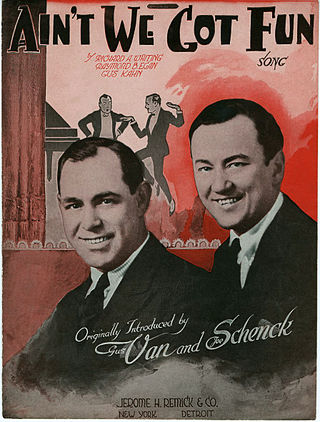
"Ain't We Got Fun" is a popular foxtrot published in 1921 with music by Richard A. Whiting, lyrics by Raymond B. Egan and Gus Kahn.
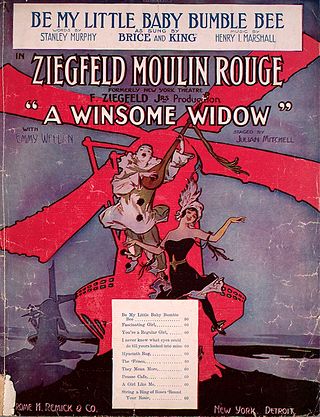
"Be My Little Baby Bumble Bee" is a popular song. The music was written by Henry I. Marshall and the lyrics by Stanley Murphy. The song was published in 1912, and appeared in the 1912 play A Winsome Widow.

Tea for Two is a 1950 American musical romantic comedy film starring Doris Day and Gordon MacRae, and directed by David Butler. The screenplay by Harry Clork was inspired by the 1925 stage musical No, No, Nanette, although the plot was changed considerably from the original book by Otto Harbach and Frank Mandel; and the score by Harbach, Irving Caesar, and Vincent Youmans was augmented with songs by other composers.
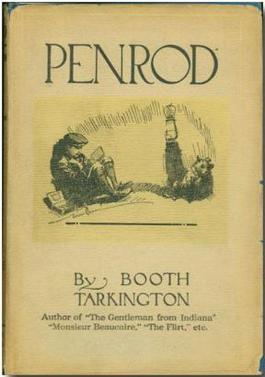
Penrod is a collection of comic sketches by Booth Tarkington that was first published in 1914. The book follows the misadventures of Penrod Schofield, an eleven-year-old boy growing up in the pre-World War I Midwestern United States, in a similar vein to The Adventures of Tom Sawyer. In Penrod, Tarkington established characters who appeared in two further books, Penrod and Sam (1916) and Penrod Jashber (1929). The three books were published together in one volume, Penrod: His Complete Story, in 1931.
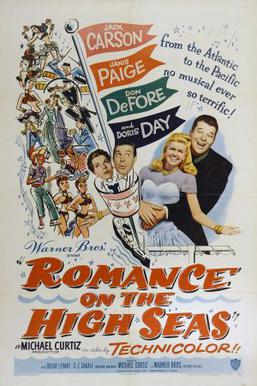
Romance on the High Seas is a 1948 American musical romantic comedy film directed by Michael Curtiz, and starred Jack Carson, Janis Paige, Don DeFore and Doris Day in her film debut. Busby Berkeley was the choreographer. The film was nominated for two Academy Awards, for Original Song for "It's Magic", and Music, Scoring of a Musical Picture.

The West Point Story is a 1950 musical comedy film starring James Cagney, Virginia Mayo and Doris Day, and directed by Roy Del Ruth.
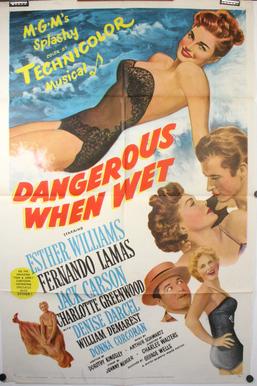
Dangerous When Wet is a 1953 American live-action/animated musical comedy film starring Esther Williams, Fernando Lamas and Jack Carson, directed by Charles Walters and featuring an animated swimming sequence starring Williams with the cat-and-mouse duo Tom and Jerry.

If I Had My Way is a 1940 musical comedy film directed by David Butler and starring Bing Crosby and Gloria Jean. Based on a story by David Butler, the film is about a construction worker who takes charge of the daughter of a friend killed in an accident.
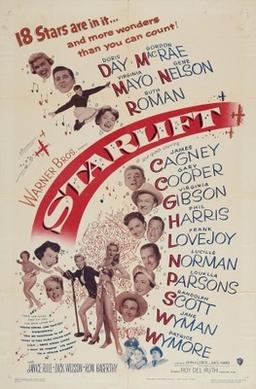
Starlift is a 1951 American musical film released by Warner Bros. starring Doris Day, Gordon MacRae, Virginia Mayo, Dick Wesson, and Ruth Roman. It was directed by Roy Del Ruth and written by Karl Lamb and John D. Klorer. The film was made during the beginning of the Korean War and centers on a U.S. Air Force flyer's wish to meet a film star, and her fellow stars' efforts to perform for injured men at the air force base.

The Best Things in Life Are Free is a 1956 American musical film directed by Michael Curtiz. The film stars Gordon MacRae, Dan Dailey, and Ernest Borgnine as the real-life songwriting team of Buddy DeSylva, Lew Brown, and Ray Henderson of the late 1920s and early 1930s, and Sheree North as Kitty Kane, a singer.

Shine On, Harvest Moon is a 1944 musical–biographical film about the vaudeville team of Nora Bayes and Jack Norworth, who wrote the popular song "Shine On, Harvest Moon." The film was directed by David Butler and stars Ann Sheridan and Dennis Morgan Sheridan's singing voice was dubbed by Lynn Martin.
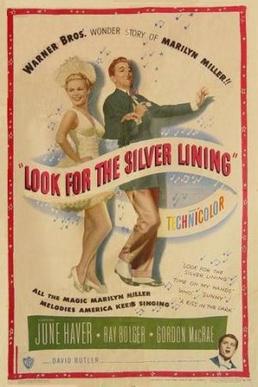
Look for the Silver Lining is a 1949 American biographical musical film directed by David Butler and written by Phoebe Ephron, Henry Ephron and Marian Spitzer. A biography of Broadway singer-dancer Marilyn Miller, it stars June Haver and Ray Bolger. It was nominated for an Academy Award for best scoring for a musical picture in 1950.

The Daughter of Rosie O'Grady is a 1950 American musical film directed by David Butler. It stars June Haver and Gordon MacRae. The story is mostly about the lives of musical performers in New York in the closing years of the 19th century. Most of the songs were written for the movie, but "Rose of Tralee" dates from the 19th century, and the song "The Daughter of Rosie O'Grady" dates from 1917.
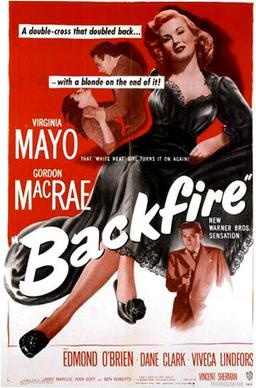
Backfire is a 1950 American film noir crime film directed by Vincent Sherman starring Edmond O'Brien, Virginia Mayo, Gordon MacRae, Viveca Lindfors and Dane Clark.
